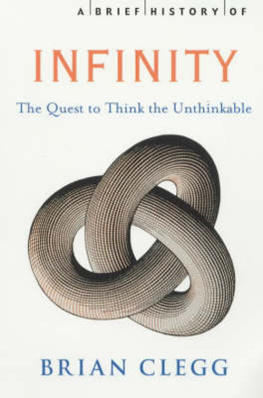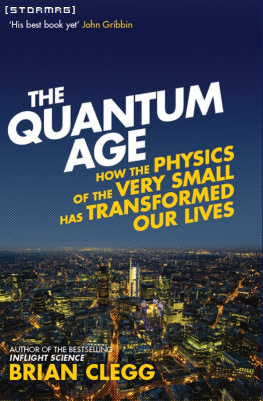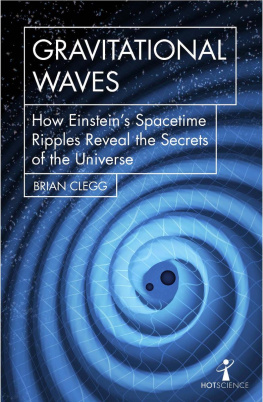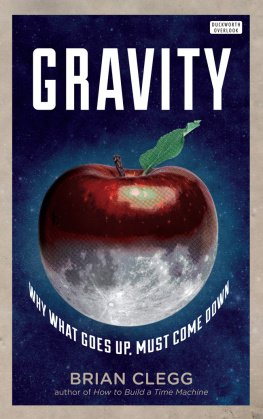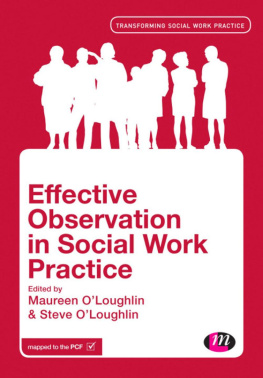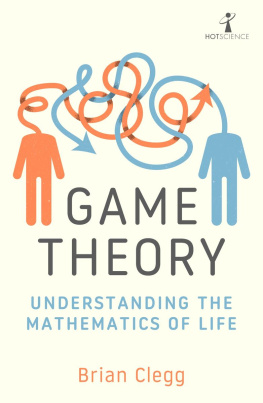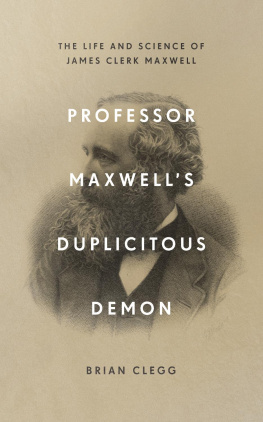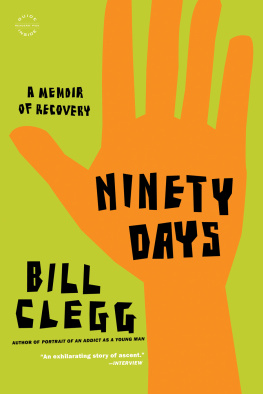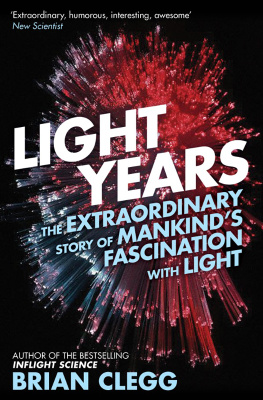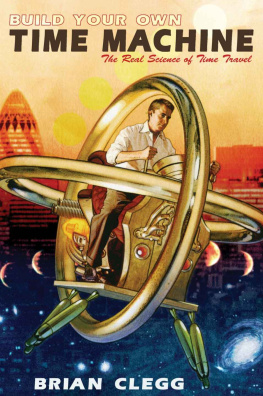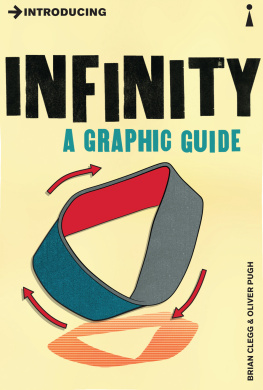Clegg - Self-Observation in the Social Sciences
Here you can read online Clegg - Self-Observation in the Social Sciences full text of the book (entire story) in english for free. Download pdf and epub, get meaning, cover and reviews about this ebook. City: London, year: 2018, publisher: Routledge, genre: Religion. Description of the work, (preface) as well as reviews are available. Best literature library LitArk.com created for fans of good reading and offers a wide selection of genres:
Romance novel
Science fiction
Adventure
Detective
Science
History
Home and family
Prose
Art
Politics
Computer
Non-fiction
Religion
Business
Children
Humor
Choose a favorite category and find really read worthwhile books. Enjoy immersion in the world of imagination, feel the emotions of the characters or learn something new for yourself, make an fascinating discovery.

Self-Observation in the Social Sciences: summary, description and annotation
We offer to read an annotation, description, summary or preface (depends on what the author of the book "Self-Observation in the Social Sciences" wrote himself). If you haven't found the necessary information about the book — write in the comments, we will try to find it.
Clegg: author's other books
Who wrote Self-Observation in the Social Sciences? Find out the surname, the name of the author of the book and a list of all author's works by series.
Self-Observation in the Social Sciences — read online for free the complete book (whole text) full work
Below is the text of the book, divided by pages. System saving the place of the last page read, allows you to conveniently read the book "Self-Observation in the Social Sciences" online for free, without having to search again every time where you left off. Put a bookmark, and you can go to the page where you finished reading at any time.
Font size:
Interval:
Bookmark:
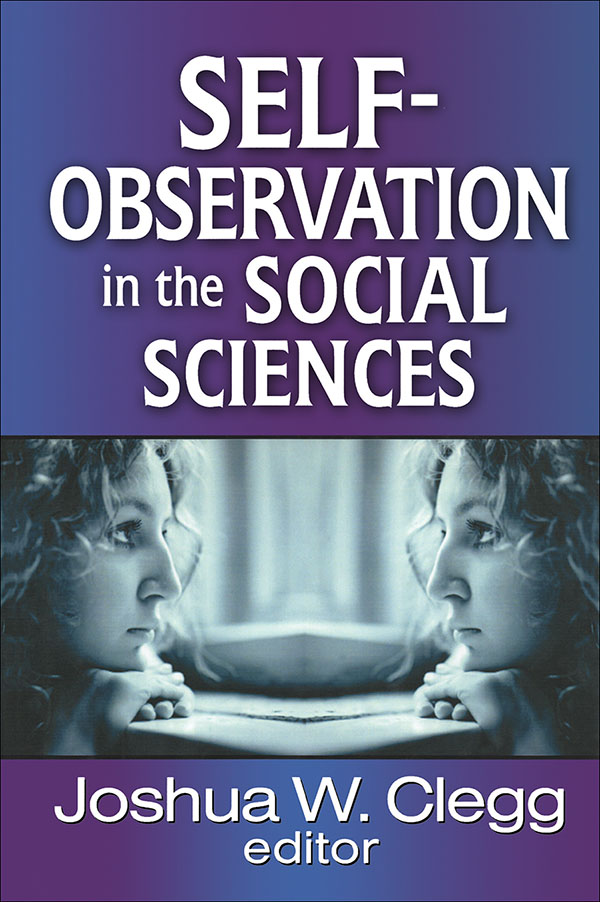
First published 2013 by Transaction Publishers
Published 2017 by Routledge
2 Park Square, Milton Park, Abingdon, Oxon OX14 4RN
711 Third Avenue, New York, NY 10017, USA
Routledge is an imprint of the Taylor & Francis Group, an informa business
Copyright 2013 by Taylor & Francis
All rights reserved. No part of this book may be reprinted or reproduced or utilised in any form or by any electronic, mechanical, or other means, now known or hereafter invented, including photocopying and recording, or in any information storage or retrieval system, without permission in writing from the publishers.
Notice:
Product or corporate names may be trademarks or registered trademarks, and are used only for identification and explanation without intent to infringe.
Library of Congress Catalog Number: 2012013891
Library of Congress Cataloging-in-Publication Data
Self-observation in the social sciences / Joshua W. Clegg, editor.
p. cm.
Includes bibliographical references and index.
ISBN 978-1-4128-4949-4
1. Introspection. 2. Self-perception. 3. Observation (Psychology) I. Clegg, Joshua W.
BF316.S45 2013
150.72dc23
2012013891
ISBN 13: 978-1-4128-4949-4 (hbk)
, by Jaan Valsiner
There is no doubtintrospection as a method needs to be restored to its central place among all the methods that are aimed at studying human psychology. This is a simple necessity to maintain the specific nature of psychology as a science in its own rightsrather than reduce it downwards (to physiology or to functional neuroanatomy) or upwards (to treating human beings as texts in the socio-narrative traditions). This new book that Joshua Clegg has assembled is a constructive continuation of his first treatise in 2009The Observation of Human Systems: Lessons from the History of Anti-reductionistic Empirical Psychology (Clegg 2009). The lessons of 2009 have led to a positive new methodological program by 2012one of the clear and prominent restoration of introspection as the primus inter pares in human psychology. However, that restoration of the misunderstood, discredited, and feared method is not a return to where that method was in the beginning of the twentieth century. It comes to us a hundred years later with a new twistthe explicit focus on the social context of both the introspecting Observer and the Experimenter. The present volume stands at the intersection of the history of holistic approaches in psychology (Diriwchter and Valsiner 2008) and its emerging new dynamic ways of constructing methods (Abbey and Surgan 2012).
Psychology hasfrom its beginning in the eighteenth and nineteenth centuriesbeen ambivalent as to its primary object of investigationthe psyche (Rosa 2007). It has gone through various fashions of denying that objectand replacing it with othersbehavior, cognition, and even positive psychology. Different -isms have dominated the minds of psychologistsfrom behaviorism to cognitivism to evolutionism and socioculturalism. Who knows what fashionlabeled by an -ismcomes next, but what is clear is that invention and proliferation of such schools of thought distances psychologys research enterprise precisely from what science needs to doto study its object phenomena. If a psychologist claims I take a X-ist (or Y-ian, e.g., vygotskian) perspective on Z one can guarantee that Z will be pushed into a framework of an orthodox belief system, rather than kept as the source for innovative understanding. The -isms fixate the perspective takenrather than enable its flexible move. They try to standardize science, while scientific discovery necessarily runs ahead of any effort toward its fixation. Categorization units of thought systemsschools in science or systems in psychologymay be useful for didactic purposes in teaching beginning undergraduates to navigate through the grand confusion of psychological perspectives. Yet, such systematization fails to capture the essence of scienceto always be striving toward the horizons that we do not know yet. Science is not about sure knowledge that we can proudly present to outsiders, but a discovery process (Valsiner 2012b, viii) of something less than knowledge (of the past) and not yet knowledge (in the presentsee Polanyi 1962, 135).
Psychological evidence does not come in neatly sealed packages. Knowledge is not a consumer productwith dates of usability institutionally printed on the packages. Thus, any science operates on the outer frontier of knowledgerather than collects data by established proceduresstandardized methods. The latter are in vogue in psychology. In tandem with socially obligatory quantification of psychological phenomena into dataan operation proven to be fallacious (Michell 1999)psychology has generated a vast flow of empirical artifacts that do not stand the test of time, or reality. Phenomena in psychology have remained lostas my friend and former colleague Bob Cairns once eloquently pointed out (Cairns 1986). Psychologystriving to show its allegiance with what is supposed to be a sciencebecomes highly effective in that social game. The result of such success in social recognition is the failure in providing solutions to deep, basic, human problemsthat range from the deep privacy of sexuality to the hyperinflated public discourses about genocides, peace, democracy, and those heroic villains of the stock market that are easy to blame for any economic problem.
Human lives are not reducible to their constituent elements. Human beings create affective and cognitive complexes with the help of which they live. Wherever we look we are surrounded by dynamic structuresin music (Langer 1953), in paintings (Kandinsky 1979) and photographs (Barthes 1982), and in the ornaments that surround us (Valsiner 2008). These structures undergo constant transformationas human beings actively change them to act forwardtoward their futuresinto their worlds. In such coping with uncertaintywhile acting toward my future-to-become-my presentI do not precisely know how to act best. Redundancyacting both by parallel ways to reach the same goal, or creating a hierarchical command and meaning center for my actionare ways to cope with such uncertainty. Human beings create, execute, and abandon multilevel action plans that include both tools for acting and reflection upon that process of acting. The human psyche creates its own hierarchical order.
Hence it is at least mildly ironic that psychology over the twentieth century has successfully lost from focus the consideration of hierarchical Gestalts that transform as they are being used by their constructors. The relevant phenomena of human psyche have been replaced by counting of elementary constituents as if these could be treated separately from the whole within which they function.
It was Lev Vygotskya young literary scholar turned into a psychologistwho warned about the need for psychology to find its own unit of analysis, if it were to become an autonomous science. As Vygotsky claimed:
Psychology, as it desires to study complex wholes... needs to change the methods of analysis into elements by the analytic method that reveals the parts of the unit [literally: breaks the whole into linked unitsmetod... analiza,... razchleniayushego na edinitsy]. It has to find the further undividable, surviving features that are characteristic of the given whole as a unity units within which in mutually opposing ways these features are represented [Russian:
Font size:
Interval:
Bookmark:
Similar books «Self-Observation in the Social Sciences»
Look at similar books to Self-Observation in the Social Sciences. We have selected literature similar in name and meaning in the hope of providing readers with more options to find new, interesting, not yet read works.
Discussion, reviews of the book Self-Observation in the Social Sciences and just readers' own opinions. Leave your comments, write what you think about the work, its meaning or the main characters. Specify what exactly you liked and what you didn't like, and why you think so.


